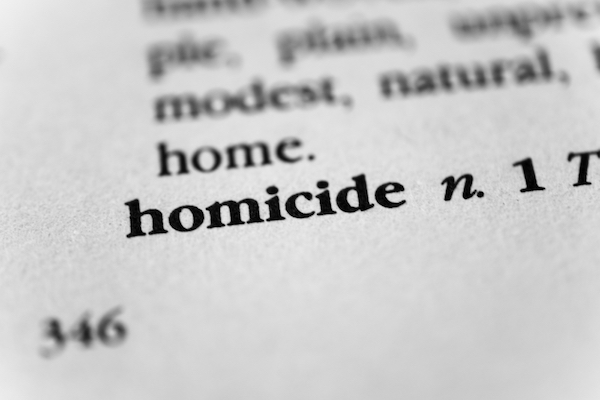If you or a loved one faces a charge of homicide, explore legal defenses for homicide charges in Texas.
Almost nothing is more terrifying and stressful than being charged with a felony homicide. Consequences for being convicted of this kind of offense—including murder, manslaughter, and reckless manslaughter—can be severe, including life in prison or even capital punishment (the death penalty). Texas is one of the worst places in the United States to face homicide charges, since it is known throughout the country for its harsh sentences for people convicted of these crimes.
Finding a criminal defense team with the expertise needed to position a homicide case for success is critical. An attorney must understand the specific evidentiary rules that apply and keep abreast of complex, changing case law in order to know how to properly investigate and prepare the defense strategy.

What others say
Neal is Your Go-To Man!
“When my world got turned upside down I needed the best Criminal Attorney in town. I was facing false MURDER accusations and convicted by the media, “Neal was the go to man.” Neal and his team reviewed my case and immediately found discrepancies. He saw issues that I, myself, had questioned; I knew I was in good hands. Neal was very professional, attentive, and straightforward. He went above and beyond to prove my innocence and never gave me any false hope. After almost two years, Neal’s efforts resulted in a dismissal. If you are facing any serious charges, Neal is YOUR go to man!”
Houston | Client falsely accused of murder & in search of a criminal attorney
Verified Client
Could Have Made
“My child was charged with capital murder and me knowing a few people that had been sentenced for the same charge had me feeling worried. My spouse and I researched many different lawyers and decided to hire Neal Davis and Jed Silverman (Super Lawyers). Best choice we could have made. They immediately started working on the case and kept us with details from the beginning to the end and the outcome was a lot better than anyone could have expected. All I can say is my child will still be young when they return home. And we can’t thank this team enough for their hard work, commitment, and dedication.”
Capital murder charges (2021)
Verified Customer
What is homicide?
In legal terms, the term means that a person’s actions cause the death of another person. While such homicide, or the killing of another person, can bring severe punishments ranging up to the death penalty, it also can involve lesser charges and punishments, as in a case of self-defense.
Different types of homicide
There are different types of criminal homicide under Texas law. What are these?
Largely homicide is divided into two categories: murder and manslaughter.
What is manslaughter?
A manslaughter conviction depends upon proving beyond a reasonable doubt that a defendant recklessly caused another person’s death.
What constitutes such recklessness? It means that the defendant’s actions posed a substantial and unjustifiable risk of death to the other person and also deviated from what an ordinary person would have considered a standard of care to avoid doing serious harm. In addition, recklessness means that the defendant knew that his or her actions involved a possibly life-threatening risk to another person but acted anyway.
On the other hand, if it can be established that the defendant was not aware of such a substantial and unjustifiable risk to another person, this could constitute what is known as criminally negligent homicide.
A charge of criminally negligent homicide is a lesser charge which can be punished with a jail term of 180 days to two years. By contrast, a manslaughter charge is a second-degree felony, and a conviction can bring punishments of 2 to 20 years in state prison and a fine of as much as $10,000. Under Texas homicide laws the crime of manslaughter can be either voluntary or involuntary. This is unlike some other states, which treat voluntary manslaughter and involuntary manslaughter separately.
However, Texas does have a separate, specific crime known as intoxication manslaughter. This means that a person who causes a death was impaired by alcohol or other drugs. (Yes, alcohol is a drug in itself.) Usually an intoxication manslaughter charge involves a drunk driver. An intent to kill does not need to be proven in order to convict someone of manslaughter in Texas, although it does need to be proven in a murder case.
What is murder?
As for what is murder under Texas homicide laws, that means a person must have willingly and knowingly caused the death of another person.
Unlike a manslaughter charge, where a death can be caused recklessly but without an intent to kill, a murder charge means that the defendant meant or intended to cause serious bodily harm or death. It means the killing was deliberate.
A murder charge in Texas also applies if the defendant meant to commit a felony other than manslaughter and that crime then resulted in a death.
Texas murder laws also make a distinction between murder and capital murder.
This is unlike other states which divide the crime of murder into first degree murder and second degree murder. In Texas, murder and capital murder are separated depending on their severity and their circumstances.
Murder and capital murder differences

The differences between a murder charge and a capital murder charge essentially revolve around whether the crime of murder is such that it can result in capital punishment, which is to say the death penalty. When that is the case, the murder is considered a capital murder.
Capital murder charges can result when the homicide crime involves certain circumstances. These include killing a firefighter or a police officer; killing more than one person; killing someone in prison; and killing someone for a fee. These are all capital murder crimes in Texas.
Though facing a capital murder charge, a person who is convicted of capital murder in Texas will not necessarily be executed (although Texas leads the nation in executions, with more than 840 since 1930, and Texas executions increased in 2018).
Rather than death by lethal injection, punishment for a capital murder conviction in Texas also can bring an alternative sentence of life in prison without the possibility of parole.
A murder charge (as opposed to a capital murder charge) which does not involve capital punishment is considered a first-degree felony in Texas. It can be punished with a sentence of 5 to 99 years in prison and a fine of up to $10,000.
The defense of self-defense
Your experienced homicide defense lawyer from our law firm can explore a variety of defenses for a murder or manslaughter charge. Among these are self-defense, in which a person killed someone who was threatening his or her own life or was threatening the life of another person.
Under Texas law, a person has a legal right to use force against an aggressor who is attacking them, or is committing or threatening to commit certain criminal acts, or unlawfully enters a person’s residence.
However, a person who claims to have killed in self-defense cannot have done so in response to verbal provocation. Also, the self-defense must be proportionate to the threat against them. For instance, if you were threatened by a person who was clenching their fists and then shot that person multiple times until they were dead, that would not be considered a proportionate or reasonable response to constitute legal self-defense.
To use self-defense in defending against a murder charge, it must be established that a reasonable person would consider the force used in self-defense was justified and warranted. It doesn’t matter if the defendant considered it justified, but rather if an ordinary, reasonable person would see it that way.
What’s the law?

Homicide occurs when someone causes another person’s death. In Texas, the most common forms of homicide are murder and manslaughter, including reckless manslaughter. Murder involves knowingly killing another. Preparation doesn’t have to be intricate or long. “Planning” can take place in a matter of seconds. Murder is a first-degree felony, with a prison term of 5 to 99 years, or life.
There is no probation for someone convicted of murder in Texas. Manslaughter means that a person unintentionally caused another’s death. Reckless manslaughter occurs when someone kills another due to “reckless” behavior—meaning they knew their actions posed a risk. This is commonly filed when drivers commit two or more traffic violations—for instance, speeding and weaving in traffic—causing a fatal collision. Reckless manslaughter is a second-degree felony, with a punishment of 2 to 20 years in prison and up to a $10,000 fine.
Insanity, crime of passion defenses
Reduced charges or punishments also can be sought by establishing that a murder was due to insanity of the defendant, or due to the murder being a crime of passion.
Such a crime of passion means that the killing resulted from a sudden strong impulse, such as extreme anger, and was not a premeditated or deliberate act. A crime of passion, then, would involve a lesser charge of manslaughter and not murder, which involves an intent to kill.
Get the best Houston homicide defense lawyer
As you can see, murder and manslaughter charges under Texas homicide laws are serious and involve serious punishments. That means you must get the best Houston criminal defense lawyer you can find to plan your homicide defense.
If you or someone in your family faces a homicide charge in Houston, Harris County, Fort Bend County or Montgomery County, reach out to us at the Neal Davis Law Firm today.
When you contact us, we will quickly provide you a legal review of your case. Then you can decide how you want to proceed when seeking defenses for a homicide charge in Texas.
At the Neal Davis Law Firm, we have achieved favorable results in a variety of complicated homicide cases. We are experienced in asking the right questions, uncovering all the relevant evidence, and building the best strategy for every case. Our record of charges declined, even in difficult cases, ranks us among the top criminal defense teams in Texas. Here are some examples:
- Charge DISMISSED in high-profile murder case
- PROBATION for young professional charged with intoxication manslaughter
- NO BILL (grand jury refused to indict) for a hotel owner charged with murder after shooting an intruder
- NOT GUILTY for a retiree charged with attempted murder after shooting in self-defense
- NO BILLS in multiple intoxication manslaughter cases
- CHARGES NOT FILED in double homicide investigation
- DEFERRED ADJUDICATION for a pre-med student charged with negligent homicide (street racing)
- DEFERRED ADJUDICATION for a salesman charged with reckless manslaughter (intoxication involved)






